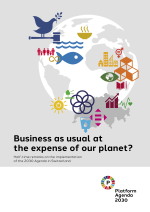Switzerland
Published on Thu, 2022-07-28 17:53
Switzerland is not on course for a sustainable world. That’s the verdict from Platform Agenda 2030 in its new report “Business as usual at the expense of our planet? Half-time remarks on the implementation of the 2030 Agenda in Switzerland”. It is calling upon the Federal Council to show more leadership in the transformation needed to halve poverty, protect the climate and human rights, and hold the financial sector to account. |
Published on Fri, 2019-03-15 12:13
The report on Switzerland by the NGO coalition Alliance Sud emphasizes the negative spillovers of policies: “Swiss foreign economic policy and its international financial and fiscal policy are still far from taking sufficient account of the requirements of the 2030 Agenda.” After a visit to Switzerland, UN Independent Expert on foreign debt and other financial obligations Juan-Pablo Bohoslavsky drew attention in a report to the Human Rights Council to deficiencies in the prevention of unfair financial flows and problems in the area of international corporate taxation: “The existing Swiss tax privileges for the foreign profits of multinational corporations ... create massive incentives for profit transfers to Switzerland and help to deprive developing countries of potential tax revenues in the hundreds of billions.” |
Published on Mon, 2018-07-16 00:00
The experience of Voluntary National Reviews and of Civil Society shadow (or spotlight) reporting. The side event "SDG Implementation at National Level: What’s the Point of National Reports?" was held on July 17 in New York, during the meeting of the High Level Political Forum of the UN. The debate focused on voluntary national reports (VNRs) and parallel “shadow” or “spotlight” reports generated by civil society organizations (CSOs) on progress towards the Sustainable Development Goals (SDGs). |
|
According to UN estimates, achieving the Sustainable Development Goals (SDGs) will require an investment of the order of US$ 5,000 to 7,000 billion – annually!1 The need for financing seems enormous, but is put into a certain perspective if we remember that annual global economic output (measured as the combined gross domestic products of all countries) is estimated by the World Bank at around US$ 76,000 billion.
The need for funding must also be set off against the funds that are looking for investment opportunities. These naturally include pension fund assets, which by their nature have a long investment horizon. In 2014, the assets under management at the 300 largest public and private pension funds in the world totalled US$ 15,400 billion. And in 2016, assets invested by Swiss pension funds alone stood at CHF 823.9 billion. Enormous sums of money pass through Switzerland’s financial centre overall. For example, in 2018 there is more than CHF 6,170 billion held in securities in customer accounts with Swiss and Liechtenstein banks – assets that are used in investment advisory and/or asset management services.
|
Published on Tue, 2018-07-03 00:00
Swiss civil society – organized in the Platform Agenda 2030 – presented its report entitled «How sustainable is Switzerland? Implementing the 2030 Agenda from a civil society perspective». Platform Agenda 2030 – Press Release of 3 July 2018 |
Published on Wed, 2018-04-11 14:43
Figures released on 10 April by the Federal Council show that Switzerland has clearly missed its own development assistance target. The country is thus moving further away from the international goal of allocating 0.7% of gross national income to development funding. While this allocation remained just about stable across OECD countries, in Switzerland it dropped from 0.53% to 0.46%. A hefty 14% contraction. |
Published on Thu, 2017-04-27 16:05
To show that it takes the 2030 Agenda seriously, Switzerland needs to look at the damaging impact of its international financial and fiscal policies, argues Eva Schmassmann, from the Swiss coalition of development organizations Alliance Sud. "With over 3,000 billion USD of managed foreign assets, Switzerland – as a financial center – is the largest offshore haven in the world and one of the preferred low tax areas for global companies. Developing countries are losing billions in income that they could be using to implement sustainable development because of legal and illegal tax optimization techniques". |
SUSCRIBE TO OUR NEWSLETTER







